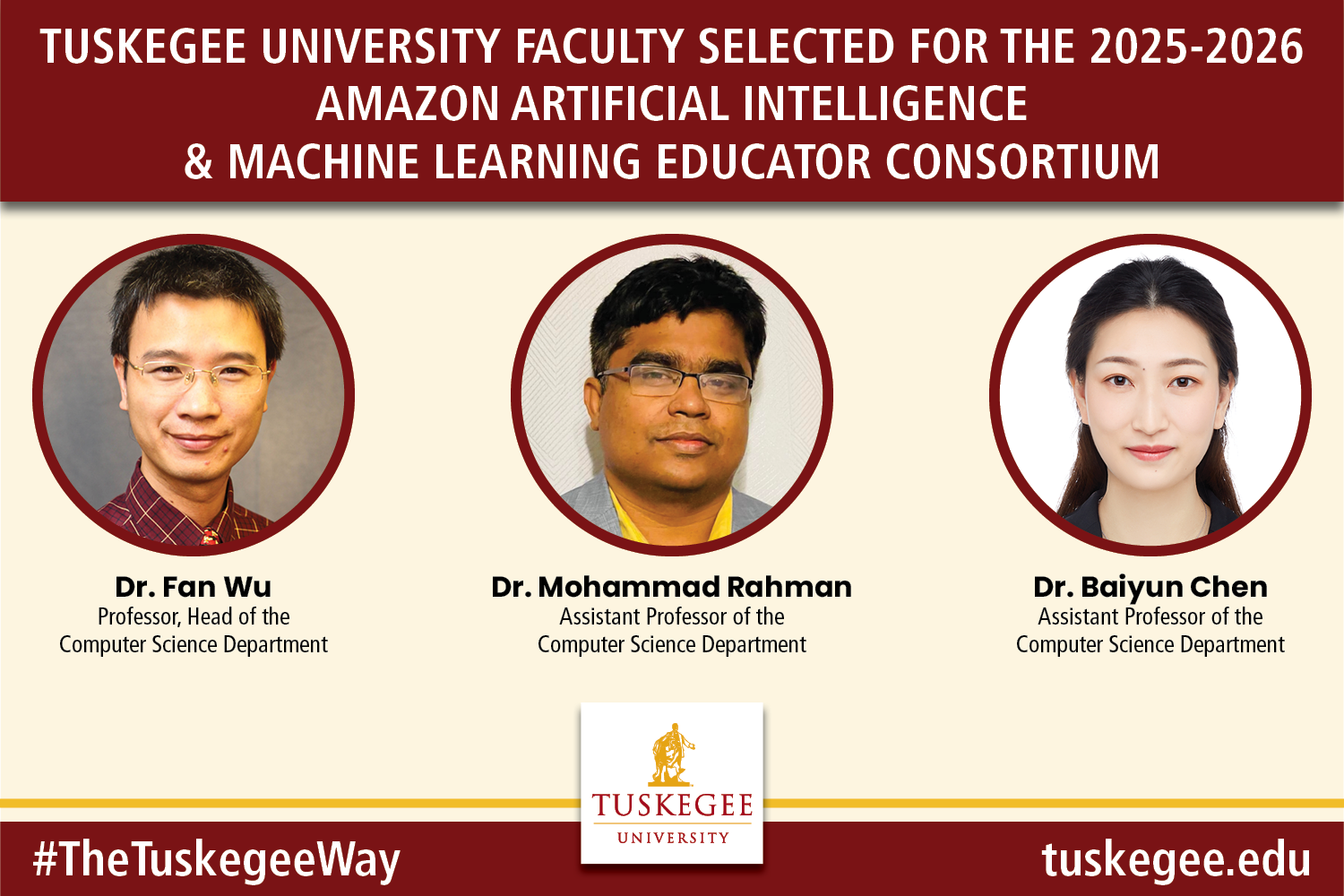Contact: Kawana McGough, Division of Development and Alumni Engagement
 TUSKEGEE, Ala. — Building on its mission to educate students to help solve the world’s most complex problems, Tuskegee University has collaborated with Amazon Web Services (AWS) through the expansion of the AWS Machine Learning University Educator Enablement Program (MLU-EEP). This national initiative, which includes 35 colleges and universities, is designed to accelerate artificial intelligence (AI) and machine learning (ML) education with a particular emphasis on supporting Historically Black Colleges and Universities (HBCUs).
TUSKEGEE, Ala. — Building on its mission to educate students to help solve the world’s most complex problems, Tuskegee University has collaborated with Amazon Web Services (AWS) through the expansion of the AWS Machine Learning University Educator Enablement Program (MLU-EEP). This national initiative, which includes 35 colleges and universities, is designed to accelerate artificial intelligence (AI) and machine learning (ML) education with a particular emphasis on supporting Historically Black Colleges and Universities (HBCUs).
“Through the Amazon-MLU Educators Consortium, AWS has supported over 35 universities, including many HBCUs, providing content and upskilling for professors to integrate AI/ML industry-aligned content into the curriculum. The schools we are working with serve over 250,000 students. This directly enables our higher education collaborators to prepare students for future careers in technology," said Joe Briggs, Global Head of Executive Engagement and Strategy at Amazon. "Our Amazon-MLU Transformation Alliance created a distinct executive engagement program to build capacity at 63 institutions and bring AI learning to 113 leaders across higher education. One thing is clear, when it comes to shaping the future, we are In This Together!"

At Tuskegee, the collaboration embeds AWS Machine Learning technology directly into the curriculum, giving both faculty and students access to the same industry-leading tools that drive global innovation. Faculty in the Department of Computer Science are incorporating Large Language Models and Generative AI learning modules developed through the AWS MLU-EEP Bootcamp into courses such as Artificial Intelligence and Data Networks & Cloud Computing.
“Tuskegee University is proud to collaborate with AWS to advance our AI and machine learning curriculum,” said Dr. Thierno Thiam, Provost and Senior Vice President for Academic Affairs. “By embedding AWS-powered learning directly into our programs, we are equipping our students with the skills, adaptability, and confidence to thrive as innovators and leaders in a rapidly evolving technology landscape.”
Tuskegee’s expertise in this area has already garnered national recognition: the university’s cybersecurity program was ranked No. 2 nationally in 2024 by Cybersecurity Guide, underscoring its reputation as a leader in preparing students for critical workforce needs. This collaboration with AWS builds upon that strength, expanding Tuskegee’s capacity to prepare graduates who are ready to meet the challenges of a rapidly evolving digital and AI-driven world.
The effort is being led by Dr. Fan Wu, Professor and Head of the Computer Science Department; Dr. Mohammad Rahman, Assistant Professor of the Computer Science Department; and Dr. Baiyun Chen, Assistant Professor of the Computer Science Department.
In collaboration with the Amazon-HBCU Educator Consortium, an initiative supported by Amazon’s Machine Learning University (MLU), Tuskegee is reinforcing its legacy as a leader in science, engineering, and innovation—continuing to produce graduates who will shape industries, strengthen communities, and help solve the most complex problems facing the world today.
About Amazon Web Services
Since 2006, Amazon Web Services has been the world’s most comprehensive and broadly adopted cloud. AWS has been continually expanding its services to support virtually any workload, and it now has more than 240 fully featured services for computers, storage, databases, networking, analytics, machine learning and artificial intelligence (AI), Internet of Things (IoT), mobile, security, hybrid, media, and application development, deployment, and management from 117 Availability Zones within 37 geographic regions, with announced plans for 13 more Availability Zones and five more AWS Regions in Chile, New Zealand, the Kingdom of Saudi Arabia, and the AWS European Sovereign Cloud. Millions of customers—including the fastest-growing startups, largest enterprises, and leading government agencies—trust AWS to power their infrastructure, become more agile, and lower costs. To learn more about AWS, visit aws.amazon.com.
About Machine Learning University
Since 2006, Amazon Web Services has been an industry leading provider of broadly adopted cloud. Through its AWS-Machine Learning University (MLU) and Educator Enablement Programs, AWS is dedicated to expanding access to artificial intelligence (AI) and machine learning (ML) education. These initiatives empower faculty and senior administrators—particularly at Historically Black Colleges and Universities (HBCUs) and community colleges—to integrate AI/ML into undergraduate instruction and research through hands-on technical training, open-access curriculum, and peer collaboration. By promoting inclusive and industry-aligned tech education, AWS is helping to cultivate the next generation of diverse and skilled technology leaders.
©2025 Tuskegee University


 TUSKEGEE, Ala. — Building on its mission to educate students to help solve the world’s most complex problems, Tuskegee University has collaborated with Amazon Web Services (AWS) through the expansion of the AWS Machine Learning University Educator Enablement Program (MLU-EEP). This national initiative, which includes 35 colleges and universities, is designed to accelerate artificial intelligence (AI) and machine learning (ML) education with a particular emphasis on supporting Historically Black Colleges and Universities (HBCUs).
TUSKEGEE, Ala. — Building on its mission to educate students to help solve the world’s most complex problems, Tuskegee University has collaborated with Amazon Web Services (AWS) through the expansion of the AWS Machine Learning University Educator Enablement Program (MLU-EEP). This national initiative, which includes 35 colleges and universities, is designed to accelerate artificial intelligence (AI) and machine learning (ML) education with a particular emphasis on supporting Historically Black Colleges and Universities (HBCUs).